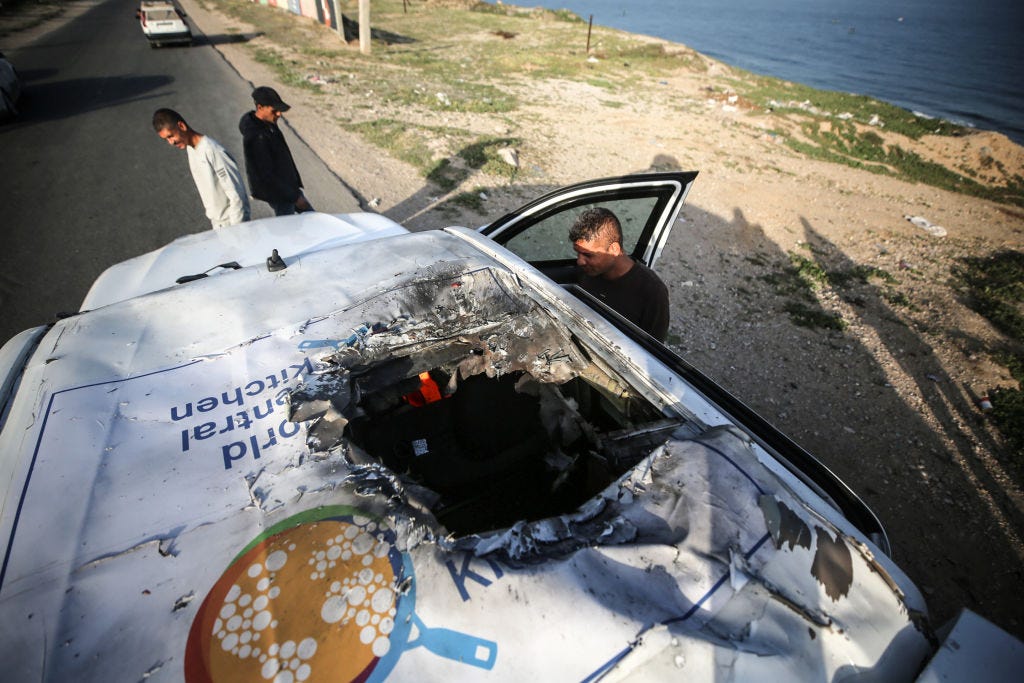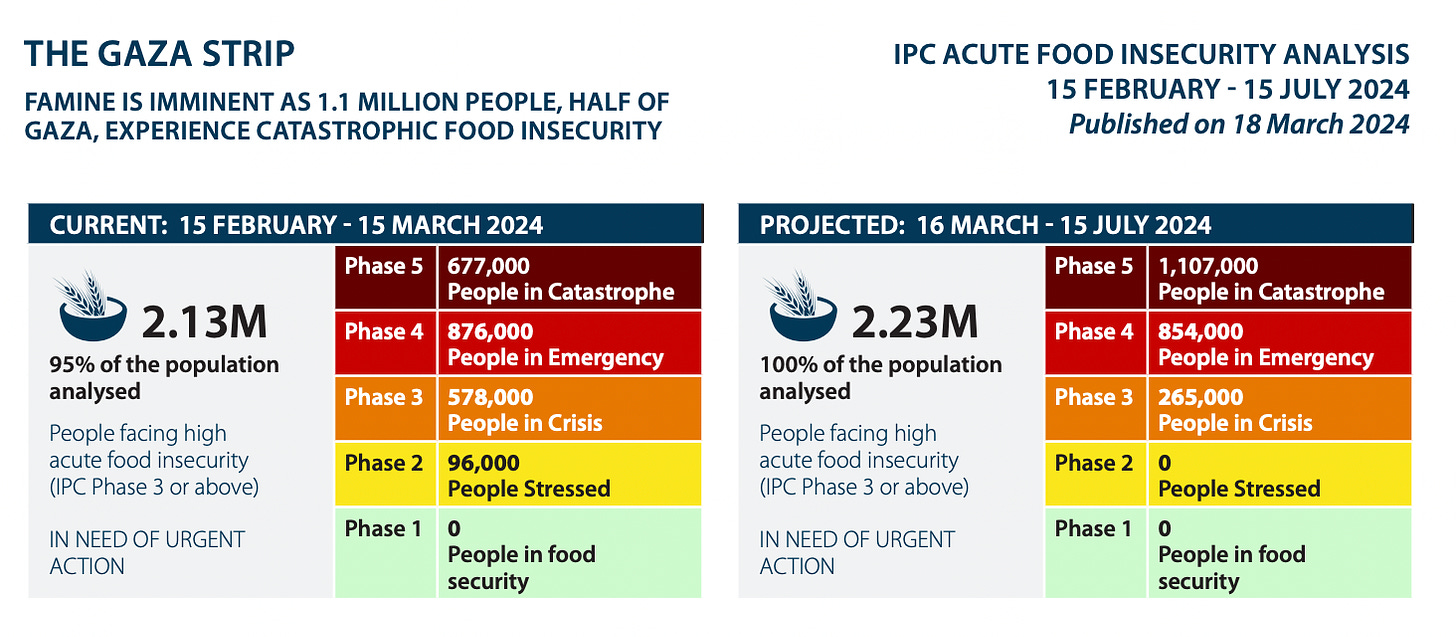The U.S. calls on Israel to prevent civilian casualties while continuing to supply weapons for it

A U.N.-backed report published in mid-March found residents of Gaza are facing “high levels of acute food insecurity.” According to aid groups, the number of people in Gaza experiencing “catastrophic hunger” has doubled since December. It’s now estimated that as many as 1.1 million people in Gaza — half of the population — are experiencing “famine-like conditions.” In parts of Northern Gaza, U.S. officials believe that a full-blown famine is already underway. And, experts say that it could spread to the rest of Gaza by May.

Despite pressure from the international community, Israel, according to reports, has repeatedly blocked aid in an apparent violation of humanitarian law. Refugees International, a nonprofit advocacy group, found that “routine and arbitrary denial of legitimate humanitarian goods from entering Gaza; a highly complicated Israeli inspection and approval process without clear or consistent instructions; frequent denials of humanitarian movements within Gaza,” among other factors, have led to a “man-made humanitarian crisis” in the Gaza Strip.
More
This makes delivering much-needed assistance almost impossible for aid groups. In February, the World Food Programme — the largest food aid organization in the world — announced it was halting operations in Gaza because “conditions were not being met to allow for the safe distribution of aid.”
This week, Israeli airstrikes killed seven aid workers at World Central Kitchen (WCK) — the food relief group founded by chef José Andrés. Workers had been traveling in branded vehicles and had coordinated their movements with the Israeli Defense Forces (IDF), yet were still targeted, WCK said. Notably, this was not the first time the IDF attacked WCK. Just days prior, WCK filed a complaint with the IDF demanding the safety of its workers after an Israeli soldier shot at a WCK staff member. Following the latest attacks, WCK said it was “immediately” pausing its relief efforts. Israel acknowledged it was responsible for the deaths of the WCK workers and said it is investigating the strike.
These deaths are just the latest aid workers to be killed by an Israeli assault. The U.N. said that over “200 humanitarian aid workers have died” since Israel launched its military campaign in Gaza. This figure, one U.N. official says, is “nearly three times as high as the death toll recorded in any other single conflict in a year.”
The WCK attack, in particular, is causing “apprehension among aid workers in the region,” Chris Skopec, executive vice president of the medical relief nonprofit Project HOPE, told the Washington Post. “The government of Israel needs to be able to give assurances that they consider aid workers legitimate actors in Gaza and that international law will be respected. We need to be able to do this critical, life-saving work safely.”
Project HOPE said Israeli military fire killed one of its workers in March. The group announced on April 2 that it was pausing its programming “for the next three days in solidarity with World Central Kitchen and to reassess the security situation.” Meanwhile, ANERA, a Washington-based aid organization, said it was suspending relief efforts in Gaza “[f]or the safety of our staff and their families” after the killing of WCK’s staffers. The organization, which also has had one of its workers killed by Israeli forces, described the decision as “unprecedented” and declared that “delivering aid safely is no longer feasible.” “[A]id distribution centers, schools and shelters run by aid groups” have also been targeted by Israel, the New York Times reported.
With critical aid groups departing or pausing their efforts, it’s likely that the crisis in Gaza will worsen. Israel previously banned UNRWA — the U.N. agency for Palestinian refugees and largest aid organization in Gaza — from distributing food in the north.
So far, Israel’s military campaign in the Gaza Strip has killed more than 32,900Palestinians — most of whom are believed to be women and children. The operation comes in response to Hamas’ surprise attack on October 7, 2023, which killed around 1200 Israelis.
The contradictions of US policy
White House spokesman John Kirby said the administration was “outraged” about the IDF strike that killed WCK’s humanitarian workers. “This incident is emblematic of a larger problem and evidence of why distribution of aid in Gaza has been so challenging,” Kirby said. “But beyond the strike, what is clear is that the IDF must do much more to improve deconfliction processes so civilians and humanitarian aid workers are protected.”
In December, Biden criticized Israel for its “indiscriminate bombing” of Gaza, which he said was undermining international support. At the beginning of March, Vice President Kamala Harris announced the administration supported “an immediate ceasefire,” lasting at least six weeks, due to “the immense scale of suffering in Gaza.” Harris said that “our common humanity compels us to act.” On March 25, the United States abstained from the UN Security Council resolution calling for an immediate ceasefire and the release of all hostages, which allowed the resolution to pass.
The Israeli government has indicated that it would not comply with the demands of the United States and the international community. “The State of Israel will not cease firing,” Israel Katz, Israel’s foreign minister, said on social media. “We will destroy Hamas and continue fighting.”
While Israel has disregarded the concerns of the international community about the impact of their military operations in Gaza on civilians, the United States has continued to supply Israel with weaponry and military aid.
On March 23, Biden signed a government funding bill that included $3.8 billion in military aid for Israel and continues to call for the passage of a supplemental funding bill that would include an additional $14 billion. Just last week, the Biden administration approved the transfer of “more than 1,800 MK84 2,000-pound bombs and 500 MK82 500-pound bombs,” according to the Washington Post. The 2,000-pound bombs, in particular, “have been linked to previous mass-casualty events throughout Israel’s military campaign in Gaza.” The State Department also recently “authorized the transfer of 25 F-35A fighter jets and engines worth roughly $2.5 billion” to Israel. Since the Hamas attack on October 7, 2023, the Biden administration has approved over 100 weapons transfers, many below the threshold that requires Congressional notification. Reuters reported on Monday that the Biden administration “is weighing whether to go ahead with an $18 billion arms transfer package to Israel that would include dozens of F-15 aircraft.”
United States law prohibits “the U.S. Government from using funds for assistance to units of foreign security forces where there is credible information implicating that unit in the commission of gross violations of human rights.” In February, Biden issued an executive order requiring that any recipients of military aid from the United States “facilitate and not arbitrarily deny, restrict, or otherwise impede, directly or indirectly, the transport or delivery of United States humanitarian assistance and United States Government-supported international efforts to provide humanitarian assistance.” Israel has provided a letter, required by the order, stating that it is meeting this standard. On March 25, the Biden administration said that Israel was in “compliance” with the order.
Seventeen Senators, all members of the Democratic caucus, wrote a letter to the Biden administration rejecting this assessment. The Senators said it is “abundantly clear that Netanyahu’s government is not doing nearly enough to allow aid to reach starving and otherwise desperate people in Gaza.” The Senators urged the Biden administration to enforce the order, and use it “to secure the necessary delivery of aid into and throughout Gaza.”
The Biden administration’s current policy is to call on Israel to cease its military operations in Gaza while continuing to supply them with weapons essential to the operation. The horrific attack on WCK’s humanitarian workers underscores that that position is untenable.
Leave a Reply